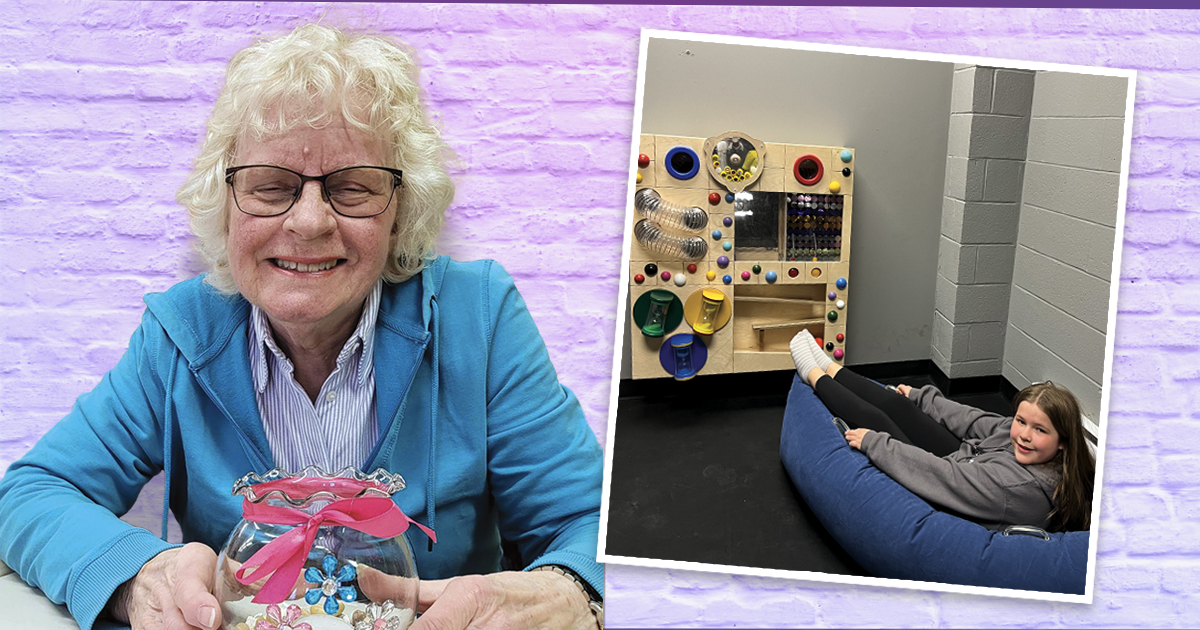“We want everyone who comes into our building, no matter who they are, to feel welcome,” says Major Darryl Simms, who served as corps officer at St. John’s Citadel, N.L., until his recent appointment as corps officer at North Street Citadel in Hamilton, Bermuda. Part of that welcome is ensuring that the building and its programs and services are accessible and inclusive of everyone. To do this, St. John’s Citadel has developed a set of accessibility objectives as part of their strategic plan.
One of the main objectives, which they call a “theology of welcome,” focuses on creating an environment and a culture where everyone who comes into the building feels welcome and included. To achieve this goal, St. John’s Citadel has appointed an accessibility champion who serves as the liaison between the congregation and corps leadership, and the corps continues to seek opportunities for innovative programming such as its Deaf ministry and a new sensory room.
Innovative Ideas

For many families with children who experience exceptionalities, attending church services can be challenging. Lindsey Kelly, a congregant at St. John’s Citadel and parent of a child with exceptional needs, is on the program committee at the corps. When she heard the territorial call for innovation grant proposals in 2021, she pitched her idea for a sensory room—a comfortable and safe space designed for individuals who may be overwhelmed by the sensory input in a traditional worship setting.
The room has a mixture of engaging and calming features such as a colourful bubble tube, dynamic lighting, a wall-mounted fidget board, modular seating, weighted and textured pillows, noise-cancelling headphones and a “pea pod,” a seat designed to apply pressure to the body and provide sensory relief. Other modifications were made to the room such as adding a durable foam floor, darkening blinds and rounded-edge baseboards. It is open to everyone through a sign-up process, including congregants, parents and children, or community partners such as occupational therapists who wish to use the room with their clients.
“I hope it will make programs more accessible for families and help bring people into our building throughout the week,” says Kelly. “Parents can come to the church knowing that it is a safe and accepting place for their child.
“We’re addressing a need that is not being addressed otherwise. By having this sensory room at the corps, members of the congregation will be able to see what accessibility looks like for people who have exceptional needs and who may have difficulty navigating a regular Sunday worship service,” continues Kelly. “Everybody is different, and the gospel is for everybody.”
A Learning Opportunity
One of St. John’s Citadel’s long-standing commitments to accessibility is its sign language program, which has run for more than 30 years, providing sign language interpretation during Sunday worship services.
Heidi Adams, one of the volunteer interpreters at the corps, has a brother who is deaf. When they were children, her family began attending St. John’s Citadel because they offered sign language ministry, established by Edna Dawe who led the program and interpreted for many years. At the time, no other churches in the area had this type of service available for the Deaf community.
“There is a shortage of sign language interpreters and services for deaf individuals in Canada,” says Adams. She explains that The Salvation Army once had entire branches dedicated to Deaf and blind ministry in Sweden, including Deaf and blind officers, churches and programs.“For officers who were commissioned in the Deaf stream, a lot of their work was serving people in the Deaf community,” she notes. “I am fascinated by the history of Deaf ministry in Sweden, and I would like to see more of that happening across the world and in Canada.”
Many of the youth at St. John’s Citadel have taken an active interest in learning sign language, incorporating it into their worship when they can. “A few months ago, one young woman sang on Sunday morning and one of her friends was able to stand next to her and sign while she was singing,” says Major Simms.
“The Salvation Army has a responsibility to all people, especially the vulnerable and marginalized, to explore how we can embrace and love people who have disabilities or are facing barriers. That’s why I am part of The Salvation Army,” says Adams. “We have a special calling to reach out to people who may not have anyone else reaching out to them.”
"If we can provide a service or assistance for people to come in and hear the word of God, then we want to do that." - Major Darryl Simms
Signing Up
In addition to sign language interpretation, St. John’s Citadel is part of an ecumenical committee for Deaf ministry that runs a Deaf Bible study and women’s craft group hosted in the building, and Deaf church services for occasions such as Christmas and Easter in various locations across the city. One congregant who is deaf, Emma DeFrancesco, attends the corps most Sundays, as well as events by the ecumenical committee.
“This coming September will mark five years since I moved from Boston back home to Newfoundland and- started attending St. John’s Citadel,” says DeFrancesco in an interview facilitated by Adams through ASL. “In Boston, I attended a Catholic church that provided ASL interpretation. Here in Newfoundland, my brothers, sisters and extended family go to the Salvation Army church, so I also go to the Army.”
At St. John’s Citadel, DeFrancesco can follow along with the service by watching the sign language interpreter and closed-captioned videos, and she can understand it clearly. “Without sign language, I sit twiddling my thumbs and can’t understand what’s being said,” she says.
Outside of church, DeFrancesco is involved in Deaf programming supported by St. John’s Citadel and other churches in the community. “Our church participates in the Deaf ecumenical group activities in the city, so I can attend the Deaf Bible study and Deaf ladies craft group. This year, I have also joined our church’s sewing group, Stitched With Love.”
A Welcoming Church
“The welcome that individuals receive when they first come in the door sets the tone for their entire experience,” says Major Simms. “If they feel supported, loved and appreciated, they are more likely to return to the congregation.”
The “theology of welcome” is about creating a culture of inclusivity among the people at the corps. As Major Simms notes, the word “inclusion” means nobody is left out. “Scripture encourages us to help one another. So, if we can provide a service or assistance for people to come in and hear the Word of God, then we want to do that.”
This article is the second of a four-part series on accessibility in the church. Articles will be published monthly, alternating in print and online at Salvationist.ca.
Read the rest of the series here:
Acting on Accessibility: New accessibility committee at Winnipeg's Heritage Park Temple helps meet unique human needs.
Accessing Hope: In Trail, B.C., The Salvation Army provides dignity through accessible employment and service.
Unity in Access: A new sensory room at St. Thomas Citadel, Ont., is creating a more understanding church.
Resources
- Learn ASL for free: lifeprint.com
- Check your local associationfor the Deaf for paid coursesor study online: chs.ca/service/learn-asl
- ASL Bible: deafmissions.com/aslv
This story is from:










Leave a Comment